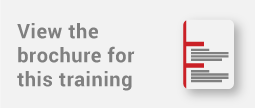Risk Assessment Methods Trainings
What are Risk Assessment Methods?
Understanding how to effectively assess risk may be a challenge for many industries. The risk assessment methods: OCTAVE, EBIOS, and MEHARI, will provide you with the sufficient knowledge on how to successfully identify and assess risk in your organization.
OCTAVE – Operationally Critical Threat, Asset, and Vulnerability Evaluation were developed by the Computer Emergency Response Team (CERT), and it was funded by the US Department of Defense. This risk assessment tool is used to help prepare organizations for security strategic assessments and planning for their information.
EBIOS – Expression des Besoins et Identification des Objectifs de Sécurité, was developed by the French Central Information Systems Security Division. The goal of this risk assessment tool is to assess and treat risks with an IS, which would result in assisting the management decision-making, and guide stakeholders to find a mutual set of discussions.
MEHARI – Methode Harmonisee d’Analyse de Risques, was developed by CLUSIF, a non-profit Information Security organization. The goal of this risk assessment tool is to mostly to provide guidelines for ISO/IEC 27005 Implementation and analyze scenario-based risks landscapes for short-long term security management.
Why are Risk Assessment Methods essential for you?
Our risk assessment methods training courses including the OCTAVE, EBIOS, and MEHARI methods, will provide you with the sufficient knowledge on how to successfully identify and assess risk in your organization. Risk Assessment Methods play a key role when it comes to protecting the business and its valuable assets. These methods will provide you with crucial guidelines on focusing on the risks that are more dangerous and that can have a huge financial and reputational damage for our business.
Benefits of Risk Assessment Methods
Being certified against Risk Assessment Methods helps you:
- To learn the concepts, methods, and practices allowing an effective risk management based on ISO 27005
- To put into practice the requirements of ISO 27001 on information security risk management
- To develop the skills needed to perform a risk assessment with the OCTAVE, EBIOS, and MEHARI techniques
- To obtain the ability to effectively guide organizations on the best practices in information security risk management
- To obtain the ability to effectively implement and manage an continuing information security risk management process


